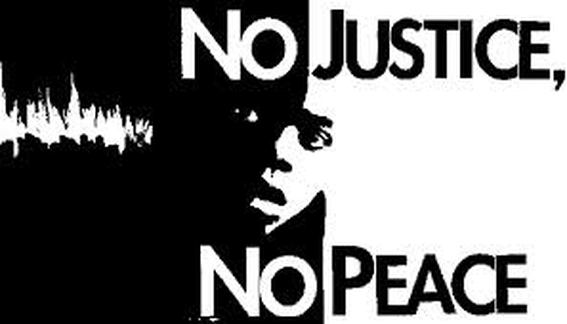Stay Vigilant
In Ferguson, Tactics Set for Grand Jury Decision in Michael Brown Case
By JOHN ELIGON, JULIE BOSMAN and MONICA DAVEY NOV. 16, 2014
Credit Whitney Curtis for The New York Times
FERGUSON, Mo. — Several dozen people gathered in a dim church basement here on Thursday night to share plans for what to do if a grand jury chooses not to indict the white police officer who shot Michael Brown, an unarmed black youth, three months ago. Among their ideas was to descend in large numbers on the nearby county seat of Clayton at 7 a.m. on the day after the grand jury’s announcement to snarl business.
A day earlier, a different group, chanting “no justice, no profit,” met in St. Louis to announce it will boycott the region’s retailers during the Thanksgiving shopping period as a response to Mr. Brown’s death.
Since August, a disparate array of demonstrators — some from longstanding organizations, others from new groups with names like Hands Up Unitedand Lost Voices — has been drawn here to protest not just the shooting of Mr. Brown, but also the broader issues of racial profiling and police conduct.
·
Now, with the grand jury’s decision expected in the coming days, the groups are preparing with intricate precision to protest the no-indictment vote most consider inevitable. Organizers are outlining “rules of engagement” for dealing with the police, circulating long lists of equipment, including bandages and shatterproof goggles, and establishing “safe spaces” where protesters can escape the cold — or the tear gas. Yet the most important part of the planning may also be the hardest: how to prevent demonstrations from turning violent. Organizers say they want their efforts here to blossom into a lasting, national movement. So they say they hope for the protests to be forceful, loud and unrelenting, but without the looting or arson that could undermine their message. But they also know that some among the ranks may be more volatile and harder to control.
“We’ve come to the conclusion that we really don’t want violence,” said one organizer with Lost Voices, who goes by the name Bud Cuzz. “We want to fix this. We still want to fight to make the laws change. We still want to raise awareness. But we don’t want the city to turn upside down.”
By JOHN ELIGON, JULIE BOSMAN and MONICA DAVEY NOV. 16, 2014
Credit Whitney Curtis for The New York Times
FERGUSON, Mo. — Several dozen people gathered in a dim church basement here on Thursday night to share plans for what to do if a grand jury chooses not to indict the white police officer who shot Michael Brown, an unarmed black youth, three months ago. Among their ideas was to descend in large numbers on the nearby county seat of Clayton at 7 a.m. on the day after the grand jury’s announcement to snarl business.
A day earlier, a different group, chanting “no justice, no profit,” met in St. Louis to announce it will boycott the region’s retailers during the Thanksgiving shopping period as a response to Mr. Brown’s death.
Since August, a disparate array of demonstrators — some from longstanding organizations, others from new groups with names like Hands Up Unitedand Lost Voices — has been drawn here to protest not just the shooting of Mr. Brown, but also the broader issues of racial profiling and police conduct.
·
Now, with the grand jury’s decision expected in the coming days, the groups are preparing with intricate precision to protest the no-indictment vote most consider inevitable. Organizers are outlining “rules of engagement” for dealing with the police, circulating long lists of equipment, including bandages and shatterproof goggles, and establishing “safe spaces” where protesters can escape the cold — or the tear gas. Yet the most important part of the planning may also be the hardest: how to prevent demonstrations from turning violent. Organizers say they want their efforts here to blossom into a lasting, national movement. So they say they hope for the protests to be forceful, loud and unrelenting, but without the looting or arson that could undermine their message. But they also know that some among the ranks may be more volatile and harder to control.
“We’ve come to the conclusion that we really don’t want violence,” said one organizer with Lost Voices, who goes by the name Bud Cuzz. “We want to fix this. We still want to fight to make the laws change. We still want to raise awareness. But we don’t want the city to turn upside down.”

